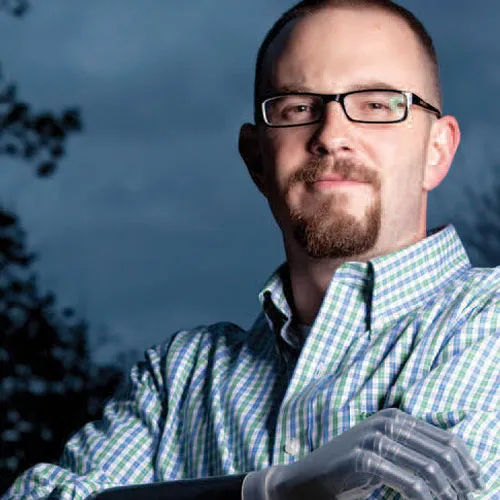

Michael
Middletown, NY
Occupation
Parks Director of Town of Wallkill Parks & Recreation Department
Technology
Myoelectric prosthesis with various terminal devices throughout the years including Greifer, i-Limb, Michelangelo & Taska
Patient Since
1988
Success Story
The User Perspective
From the point of view of Michael Nye
Written by Jordyn Robertson, OT/s
During my first visit to Handspring Clinical Services, I had the privilege of meeting Michael Nye in person after previously only interacting with him via telehealth, where Dr. Debra Latour served as the occupational therapist on his case. Sitting down with him, I was able to hear his story firsthand journey shaped by resilience, independence, and a lifetime of adaptation with prosthetic technology.
Michael Nye was born with congenital left upper limb loss, making prosthetic use a fundamental part of his life from the very beginning. Reflecting on his journey, Michael shared, “I was first fit with a passive device at two years old. Over 30 years later, I’ve never felt the need to go anywhere but Handspring. They’ve worked with me through every stage of my life, ensuring my prosthetic device is dialed in and meets my needs.”
A significant part of Michael’s journey was his mother’s unwavering advocacy. Tom Passero, founder of Handspring Clinical Services and Michael’s first prosthetist, recalls, “What can I say about Mike Nye? I have known him since he was about two and can’t recall that period without remembering his mother, who was a ‘tiger mom’ before there were tigers… She was his fiercest advocate for a powered/myoelectric arm and fought the insurance company like Joan of Arc, forcing them to overturn their denials.”
That same determination has carried over into Michael’s life today. As a supervisor overseeing nearly 40 properties and playgrounds, his prosthesis is more than just a tool—it’s essential to his ability to work. Passero continues, “In the years since, I’ve had the pleasure of seeing Michael grow from a toddler to a teenager, and into the formidable young man he is today—a respected family man and a foreman leading a team of municipal workers in his town. From a professional perspective, treating him over these many years has helped me become a better clinician, as he’s pushed me to ‘do better.’ As he began using the devices we provided to perform more tasks, it allowed him to manage the house and property he bought. Not many of my clients use chainsaws, compound bows, and rifles, in addition to the range of household tasks he manages independently. At the end of the day, I’ve sincerely enjoyed being an important part of his life, meeting his family, and sharing in his challenges and successes.”
Through self-advocacy and perseverance, Michael worked with the Handspring team to be fitted with a Taska Hand, a device that has significantly enhanced his independence. “My Taska Hand is a huge part of my daily life,” Michael explains. “It has grip strength, multi-articulating fingers, and a rubber surface that allows for a non-slip grasp. When you work with earth-moving equipment, having a reliable grip isn’t optional—it’s crucial.”
Yet, Michael’s prosthesis isn’t just about work, it’s also about the freedom to enjoy life. He and his wife spend much of their time in Maine, where they vacation and explore the outdoors on their ATV. “I’ve adapted to using my prosthesis for everything from chainsaws and compound bows to rifles and home maintenance. People often don’t realize how much prosthetic devices can do when they’re designed with real-life functionality in mind.”
Throughout his life, Handspring has been there every step of the way, ensuring his prosthetic device is tailored to meet all aspects of his lifestyle—from career to recreation. Michael’s journey is a testament to what’s possible when advocacy, determination, and specialized prosthetic care come together. His prosthetic has never been a limitation; rather, it has been a tool for independence—proving that the right fit and the right support can make all the difference.
What Stands Out
When asked about his experience with insurance denials, Michael shared that despite being denied a new Taska Hand, he remains determined. Currently, he is trialing an Esper Hand, continuing to advocate for the best technology to support his needs. His persistence in finding the right prosthetic solution reflects his lifelong commitment to adaptation, independence, and pushing the boundaries of what’s possible with prosthetic technology.
Michael's Advice
For individuals new to prosthetic use or navigating life with limb difference, Michael emphasizes the importance of personal exploration and informed decision-making. His biggest piece of advice is to avoid being swayed by what is often promoted on social media as “the best” prosthetic option.
“Many people online showcase their devices in photos and videos, but that doesn’t necessarily mean they use them in their daily lives,” he explains. While social media can be a great tool for discovering possibilities and connecting with others, it’s crucial to remember that every individual’s needs, lifestyle, and comfort level are different.
Michael encourages new amputees to take the time to trial various devices, ask questions, and work closely with their prosthetists and healthcare team to determine what feels the most natural and functional for them. Prosthetic use is a deeply personal journey, and success comes not from following trends but from finding a device that truly supports one’s mobility, independence, and quality of life.
Handspring Heroes
















































